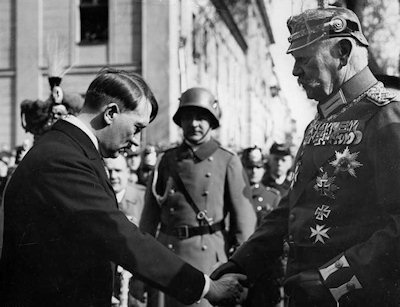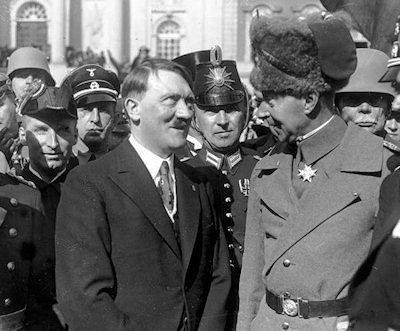
Quote:
Originally Posted by Bewolf

First of all, Hitler did not get elected chancellor. In the last free lection In November 1932 the national socialists got 33.1% of the votes. As per Wikipedia:
The results were a great disappointment for the Nazis, who once more emerged as the largest party by far but failed to form a government coalition, while again both anti-democratic parties, Nazis and Communists, together obtained the majority of seats in the Reichstag parliament. So far Chancellor Franz von Papen, a former member of the Catholic Centre Party (today CDU, Merkel is from that one), had governed without parliamentary support relying on legislative decrees promulgated by Reich President Paul von Hindenburg according to Article 48 of the Weimar Constitution. However, on 12 September 1932 Papen had to ask Hindenburg to dissolve the parliament in order to preempt a motion of no confidence tabled by the Communist Party that met with approval by the Nazis. The DNVP MPs had backed Papen, which earned them a gain of 15 seats.
Chancellor Papen urged Hindenburg to further on govern by emergency decrees, nevertheless on December 3 he was superseded by his Defence Minister Kurt von Schleicher who in talks with the left wing of the Nazi Party led by Gregor Strasser tried to build up a Third Position (Querfront) strategy. These plans failed when in turn Hitler disempowered Strasser and approached Papen who reached Hindenburg's consent to form the Cabinet Hitler on 30 January 1933.
|
Hitler Becomes DictatorAfter the elections of March 5, 1933, the Nazis began a systematic takeover of the state governments throughout Germany, ending a centuries-old tradition of local political independence. Armed SA and SS thugs barged into local government offices using the state of emergency decree as a pretext to throw out legitimate office holders and replace them with Nazi Reich commissioners.
Political enemies were arrested by the thousands and put in hastily constructed holding pens. Old army barracks and abandoned factories were used as prisons. Once inside, prisoners were subjected to military style drills and harsh discipline. They were often beaten and sometimes even tortured to death. This was the very beginning of the Nazi concentration camp system.
At this time, these early concentration camps were loosely organized under the control of the SA and the rival SS. Many were little more than barbed-wire stockades know as 'wild' concentration camps, set up by local Gauleiters and SA leaders.
For Adolf Hitler, the goal of a legally established dictatorship was now within reach. On March 15, 1933, a cabinet meeting was held during which Hitler and Göring discussed how to obstruct what was left of the democratic process to get an Enabling Act passed by the Reichstag. This law would hand over the constitutional functions of the Reichstag to Hitler, including the power to make laws, control the budget and approve treaties with foreign governments.
The emergency decree signed by Hindenburg on February 28th, after the Reichstag fire, made it easy for them to interfere with non-Nazi elected representatives of the people by simply arresting them.
March 21, 1933 - With the eyes of Germany and the whole world on him - a respectful stroll by Hitler toward the Garrison Church in Potsdam for ceremonies opening the new Reichstag session. Below: Reassuring to all - Hitler greets President Hindenburg in the manner of the age-old German custom - hand outstretched and head bowed.  Below: Inside the Garrison Church - Hitler speaks as President Hindenburg (lower right) and Germany's old guard listen. Below: Inside the Garrison Church - Hitler speaks as President Hindenburg (lower right) and Germany's old guard listen.  Below: Outside the church, a bemused Chancellor Hitler chats with the Kaiser's son and heir, Crown Prince Wilhelm. Below: Outside the church, a bemused Chancellor Hitler chats with the Kaiser's son and heir, Crown Prince Wilhelm. Below: Two days later - March 23rd - Hitler appears before the Reichstag in Berlin to reassure them that - if granted - his new powers under the Enabling Act will be used sparingly.
As Hitler plotted to bring democracy to an end in Germany, Propaganda Minister Joseph Goebbels put together a brilliant public relations display at the official opening of the newly elected Reichstag.
On March 21st, in the Garrison Church at Potsdam, the burial place of Frederick the Great, an elaborate ceremony took place designed to ease public concern over Hitler and his gangster-like new regime.
It was attended by President Hindenburg, foreign diplomats, the General Staff and all the old guard going back to the days of the Kaiser. Dressed in their handsome uniforms sprinkled with medals, they watched a most reverent Adolf Hitler give a speech paying respect to Hindenburg and celebrating the union of old Prussian military traditions and the new Nazi Reich. As a symbol of this, the old Imperial flags would soon add swastikas.
Finishing his speech, Hitler walked over to Hindenburg and respectfully bowed before him while taking hold of the old man's hand. The scene was recorded on film and by press photographers from around the world. This was precisely the impression Hitler and Goebbels wanted to give to the world, all the while plotting to toss aside Hindenburg and the elected Reichstag.
Later that same day, Hindenburg signed two decrees put before him by Hitler. The first offered full pardons to all Nazis currently in prison. The prison doors sprang open and out came an assortment of Nazi thugs and murderers.
The second decree signed by the befuddled old man allowed for the arrest of anyone suspected of maliciously criticizing the government and the Nazi Party.
A third decree signed only by Hitler and Papen allowed for the establishment of special courts to try political offenders. These courts were conducted in the military style of a court-martial without a jury and usually with no counsel for the defense.
On March 23rd, the newly elected Reichstag met in the Kroll Opera House in Berlin to consider passing Hitler's Enabling Act. It was officially called the "Law for Removing the Distress of the People and the Reich." If passed, it would in effect vote democracy out of existence in Germany and establish the legal dictatorship of Adolf Hitler.
Brown-shirted Nazi storm troopers swarmed over the fancy old building in a show of force and as a visible threat. They stood outside, in the hallways and even lined the aisles inside, glaring ominously at anyone who might oppose Hitler's will.
Before the vote, Hitler made a speech in which he pledged to use restraint.
"The government will make use of these powers only insofar as they are essential for carrying out vitally necessary measures...The number of cases in which an internal necessity exists for having recourse to such a law is in itself a limited one,"Hitler told the Reichstag.
He also promised an end to unemployment and pledged to promote peace with France, Great Britain and Soviet Russia. But in order to do all this, Hitler said, he first needed the Enabling Act. A two-thirds majority was needed, since the law would actually alter the constitution. Hitler needed 31 non-Nazi votes to pass it. He got those votes from the Catholic Center Party after making a false promise to restore some basic rights already taken away by decree.
Meanwhile, Nazi storm troopers chanted outside:"Full powers – or else! We want the bill – or fire and murder!!"
But one man arose amid the overwhelming might. Otto Wells, leader of the Social Democrats stood up and spoke quietly to Hitler.
"We German Social Democrats pledge ourselves solemnly in this historic hour to the principles of humanity and justice, of freedom and socialism. No enabling act can give you power to destroy ideas which are eternal and indestructible."
Hitler was enraged and jumped up to respond.
"You are no longer needed! The star of Germany will rise and yours will sink! Your death knell has sounded!"
The vote was taken – 441 for, and only 84, the Social Democrats, against. The Nazis leapt to their feet clapping, stamping and shouting, then broke into the Nazi anthem, the Hörst Wessel song.
Democracy was ended. They had brought down the German Democratic Republic legally. From this day onward, the Reichstag would be just a sounding board, a cheering section for Hitler's pronouncements.
Interestingly, the Nazi Party was now flooded with applications for membership. These latecomers were cynically labeled by old time Nazis as 'March Violets.' In May, the Nazi Party froze membership. Many of those kept out applied to the SA and the SS which were still accepting. However, in early 1934, Heinrich Himmler would throw out 50,000 of those 'March Violets' from the SS.
The Nazi Gleichschaltung now began, a massive coordination of all aspects of life under the swastika and the absolute leadership of Adolf Hitler.
Under Hitler, the State, not the individual, was supreme.
From the moment of birth one existed to serve the State and obey the dictates of the Führer. Those who disagreed were disposed of.
Many agreed. Bureaucrats, industrialists, even intellectual and literary figures, including Gerhart Hauptmann, world renowned dramatist, were coming out in open support of Hitler.
Many disagreed and left the country. A flood of the finest minds, including over two thousand writers, scientists, and people in the arts poured out of Germany and enriched other lands, mostly the United States. Among them – writer Thomas Mann, director Fritz Lang, actress Marlene Dietrich, architect Walter Gropius, musicians Otto Klemperer, Kurt Weill, Richard Tauber, psychologist Sigmund Freud, and Albert Einstein, who was visiting California when Hitler came to power and never returned to Germany.
In Germany, there were now constant Nazi rallies, parades, marches and meetings amid the relentless propaganda of Goebbels and the omnipresent swastika. For those who remained there was an odd mixture of fear and optimism in the air.
Now, for the first time as dictator, Adolf Hitler turned his attention to the driving force which had propelled him into politics in the first place, his hatred of the Jews. It began with a simple boycott on April 1st, 1933, and would end years later in the greatest tragedy in all of human history.
----------------------
My point is... Hitler was not opposed as he should have been, and with his cronies, backroom diplomacy turned the tide for Nazis. Governments can be overthrown, regardless of what seems insurmountable odds against it.
Last edited by nearmiss; 09-23-2011 at 07:09 PM.
|




